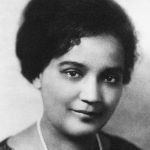I died for beauty, but was scarce
Adjusted in the tomb,
When one who died for truth was lain
In an adjoining room.He questioned softly why I failed?
“For beauty,” I replied.
“And I for truth, -the two are one;
We brethren are,” he said.And so, as kinsmen met a night,
We talked between the rooms,
Until the moss had reached our lips,
And covered up our names.
I initially chose this poem because it reminds me of Keats’ Ode on a Grecian Urn (you know, “Beauty is Truth, Truth Beauty – That is all/ Ye know on earth, and all ye need to know”?) Keats’ Ode is the best answer I could give to the question ‘why do I love poetry?’ It never fails to hypnotise and nourish me with its enchanting, awesome music… so maybe I should be writing a blog about that instead. But I don’t really feel like it; I want to write about Emily Dickinson.
Well, this poem is pretty gloomy, being about two martyrs in their tombs talking to each other until everything that remains of them has been overgrown by moss and forgotten. One died “for Beauty”, the other “for Truth”. I imagine the dead in this poem to be revolutionaries; they died for their ideals. The two ideals are “one”, and that makes the dead men “brethren”. One of the martyrs asks the other “why [he] failed”. The word failed seems important. Apart from meaning that the person died, it also implies that he failed to achieve his ideal. Is that another reason why Beauty and Truth are equal — because, in their perfect forms, they are equally impossible?
The image of the two dead men talking between their graves is a disturbing one, but in a way it is comforting too because it makes for a slow adjustment to death. The moss slowly creeps over them and their graves to silence them — covering up even the memory of them by obscuring their names. It’s a bleak outlook; death erases everything of a person, eventually. But there is no fear, no horror in this poem. I do think there is comfort here, too; there is a real sense of brotherhood between the two martyrs, and the way that they talk softly to each other and face the encroaching blackness together is a hopeful image. The men don’t express any fear in the poem — only that they are in good company — and I like that attitude, seeing as the situation they’re in is inevitable.
Not the most cheerful of poems, I know, but I really like it.
Reviewed by Emily Ardagh



